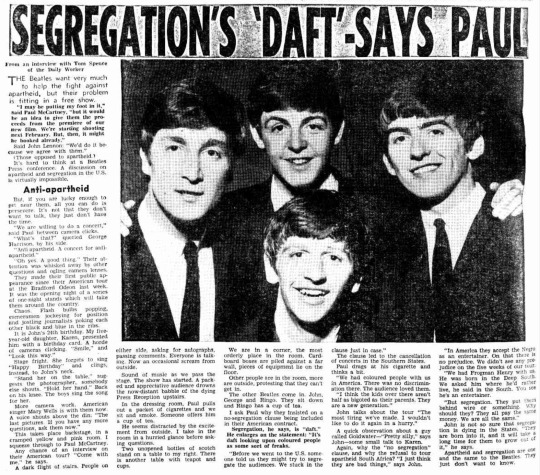#feels like an indicator of the extent of beatlemania that a leftist newspaper felt the need to interview the beatles
Text

“Segregation’s ‘Daft’ – Says Paul” (in the Tribune [Sydney, NSW], November 4, 1964)
From an interview with Tom Spence of the Daily Worker
[Full transcript beneath the cut:]
-
THE Beatles want very much to help the fight against apartheid, but their problem is fitting in a free show.
“I may be putting my foot in it,” said Paul McCartney, “but it would be an idea to give them the proceeds from the premiere of our new film. We’re starting shooting next February. But, then, it might be booked already.”
Said John Lennon: “We’d do it because we agree with them.” (Those opposed to apartheid.)
It’s hard to think at a Beatles Press conference. A discussion on apartheid and segregation in the U.S. is virtually impossible.
Anti-apartheid
But, if you are lucky enough to get near them, all you can do is persevere. It’s not that they don’t want to talk, they just don’t have the time.
“We are willing to do a concert,” said Paul between camera clicks.
“What’s that?” queried George Harrison, by his side.
“Anti-apartheid. A concert for anti-apartheid.”
“Oh yes. A good thing.” Their attention was whisked away by other questions and ogling camera lenses.
They made their first public appearance since their American tour at the Bradford Odeon last week. It was the opening night of a series of one-night stands which will take them around the country.
Chaos. Flash bulbs popping, cameramen jockeying for position and jostling journalists poking each other black and blue in the ribs.
It is John’s 24th birthday. My five-year-old daughter, Karen, presented him with a birthday card. A horde of cameras clicking. “Smile,” and “Look this way.”
Stage fright. She forgets to sing “Happy Birthday” and clings, instead, to John’s neck.
“Stand her on the table,” suggests the photographer, somebody else shouts. “Hold her hand.” Back on his knee. The boys sing the song for her.
More camera work. American singer Mary Wells is with them now. A voice shouts above the din: “The last pictures. If you have any more questions, ask them now.”
This takes place backstage, in a cramped yellow and pink room. I squeeze through to Paul McCartney.
Any chance of an interview on their American tour? “Come with me,” he says.
A dark flight of stairs. People on either side, asking for autographs, passing comments. Everyone is talking. Now an occasional scream from outside.
Sound of music as we pass the stage. The show has started. A packed and appreciative audience drowns the now-distant babble of the dying Press Reception upstairs.
In the dressing room, Paul pulls out a packet of cigarettes and we sit and smoke. Someone offers him a cup of tea.
He seems distracted by the excitement from outside. I take in the room in a hurried glance before asking questions.
Two unopened bottles of scotch stand on a table to my right. There is another table with teapot and cups.
We are in a corner, the most orderly place in the room. Cardboard boxes are piled against a far wall, pieces of equipment lie on the floor.
Other people are in the room, more are outside, protesting that they can’t get in.
The other Beatles come in. John, George and Ringo. They sit down and Ringo has a cup of tea.
I ask Paul why they insisted on a no-segregation clause being included in their American contract.
Segregation, he says, is “daft.” He enlarges on the statement: “It’s daft looking upon coloured people as some sort of freaks.
“Before we went to the U.S. someone told us they might try to segregate the audiences. We stuck in the clause just in case.”
The clause led to the cancellation of concerts in the Southern States.
Paul drags at his cigarette and thinks a bit.
“We had coloured people with us in America. There was no discrimination there. The audience loved them.
“I think the kids over there aren’t half as bigoted as their parents. They are a new generation.”
John talks about the tour[.] “The most tiring we’ve made. I wouldn’t like to do it again in a hurry.”
A quick observation about a guy called Goldwater—“Pretty silly,” says John—some small talk to Karen.
Again, why the “no segregation” clause, and why the refusal to tour apartheid South Africa? “I just think they are bad things,” says John.
“In America they accept the Negro as an entertainer. On that there is no prejudice. We didn’t see any prejudice on the five weeks of our tour.
“We had Frogman Henry with us. He was born in the Deep South. We asked him where he’d rather live, he said in the South. You see he’s an entertainer.
“But segregation. They put them behind wire or something. Why should they? They all pay the same money. We are all the same.”
John is not so sure that segregation is dying in the States. “They are born into it, and it will take long time for them to grow out of it,” he says.
Apartheid and segregation are one and the same to the Beatles. They just don’t want to know.
#cw discussion of racism#feels like an indicator of the extent of beatlemania that a leftist newspaper felt the need to interview the beatles#interview dates to october 1964#the bit about them with the journalist's daughter is so cute…#1964#paul mccartney#john lennon#the beatles#beatlemania
11 notes
·
View notes